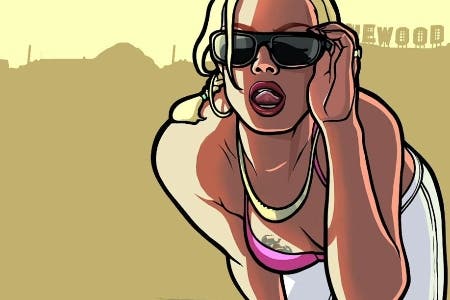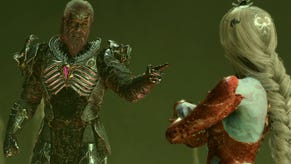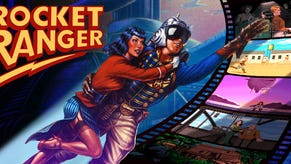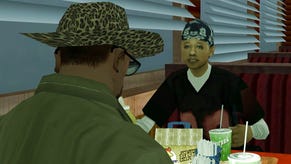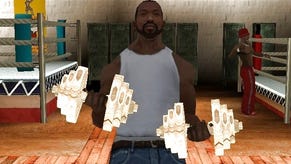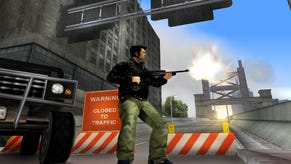Who spilled Hot Coffee?
The man who uncovered gaming's greatest sex scandal.
Not for the first time that month, Patrick Wildenborg was disoriented. With a one year-old baby in the house he was familiar with the fug of a deep sleep cut short by noise. But this awakening was different. It was prompted not by an infant's wail but the hysteria of a telephone ringing in the night. Eyes still closed, Wildenborg lifted the receiver.
“Hello, Patrick?” The accent on the end of the line was unmistakably New Yorker. “This is Rockstar. The game developer. We want to thank you for what you've done.”
---
On 14th July 2004 Sam Houser, the president and co-founder of Rockstar Games, wrote an email to Jennifer Kolbe, the company's operations director. At most other firms, its contents would have been considered 'NSFW'.
“These are some examples of content that will be displayed graphically:
- [Oral sex]
- Full sex (multiple positions)
- Dildo sex (including being able to kills [sic] someone with a dildo)
- Whipping (being whipped)
- Masturbation (one of the characters is compulsive; this MUST be kept)
“All of these items are displayed through cut-scenes [a "cut-scene" is a cinematic sequence during which game play stops] and in-game.”
He continued: “In [GTA: San Andreas] we are keen to include new functionality and interaction in line with the 'vibe' of the game. To this end, in addition to the violence and bad language, we want to include sexual content, which I understand is questionable to certain people, but pretty natural (more than violence), when you think about it and consider the fact that the game is intended for adults.”
In truth, the sort of sexual content Houser described was already in production at Rockstar North in Scotland. The team was nearing the final phase of development on the company's forthcoming blockbuster release, a Grand Theft Auto game set in the fictional American state of San Andreas.
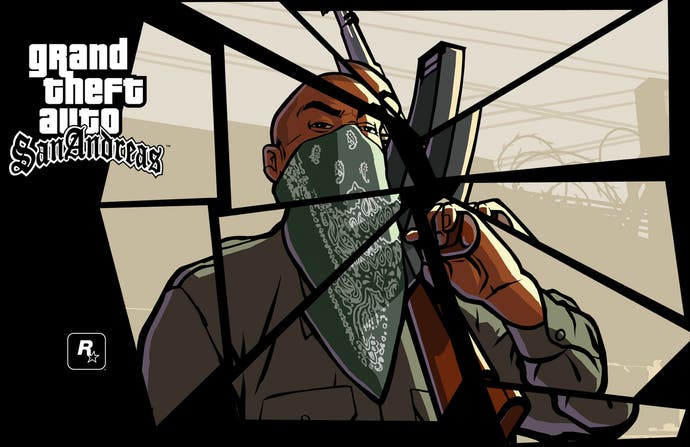
Rockstar's multi-million selling series had been billed as the enfant terrible of the video games industry by media puppet master Max Clifford. But the company's ambitions were perhaps more straightforward than the public persona suggested. Its aim was to address the darker side of modernity and all of the taboos that cinema had long explored as subject matter: organised crime, gun-running, carjacking, drug-dealing, hustling, trafficking and sex.
All this had been achieved in the company's previous games, in particular its most recent offering, GTA: Vice City. All this, that is, bar the sex. Sex was the final frontier for video games, still a taboo subject for the medium even as it permeated Hollywood's output. For years, Houser's games had encouraged players to act out on-screen violence. Now, sex was the “natural” progression, as he put it to Kolbe, an essential topic for games to cover if they were to claim the creative freedom afforded literature and cinema. Obscuring sex from the world of GTA: San Andreas would be a betrayal of vision, a self-moderating disservice to the game, to the entire medium.
But Houser understood the great contradiction at the heart of Western culture: tolerance towards violence versus intolerance towards sex. Sex: the great American blush. The email to Kolbe sought her blessing as the decision about whether this proposed sexual content was permissible rested on her shoulders. But it was possibly also a way to formalise the argument in Houser's own mind, a justification as much as a list of demands.
“I know this is a tricky area,” he concluded. “But I want to find a way for this to work.”
---
Patrick Wildenborg was born into a working-class family in 1969, in a small town in the eastern part of the Netherlands. In 1984 his parents bought him his first home computer, a Commodore 64. Like many 15-year-olds of the time, Wildenborg primarily used the machine to play games, but soon his interest widened to include the way games were made. With the help of books and magazines, he began writing his own software.

A hobby became an education became a vocation, and in 1995 Wildenborg graduated with a masters degree in computer science. The Dutchman met a girl who became his wife and the pair moved around the Netherlands as Wildenborg took up different contracts as a software and systems engineer. In 1999 the couple had their first child and he began to spend more time playing games as a means to relax.
“I was a casual gamer, never dedicated to a particular game or series,” he says today. “I came to Grand Theft Auto relatively late. Some time after the release of Vice City I borrowed the game from a friend. Perhaps it was the setting and the music or perhaps it was the humour and action. Whatever the reason, I found the game hugely attractive. When I finished the regular storyline I didn't want to stop playing. So I started completing the side-missions, seeking out the hidden packages and so on. It was the first game that I completed to 100 per cent.”
It was while hunting Vice City's myriad secrets that Wildenborg first came into contact with the game's wider community of players. “During my quest to uncover all of the game's secrets I started searching for information on the internet, and that's when I came in contact with the online fan community,” he says. “They had all the information available that I needed, and on top of that, they were all crazy about the game I'd also come to love.”
As Wildenborg became friends with some of the characters in this community he found a way to combine his love of the game and his vocation. “It was around this time I discovered people made mods for GTA. With my background as software engineer I was especially fascinated by the mods that programmed new features into the game. So I started to experiment a little and try my hand at a few.”
Wildenborg's first mod addressed one of his primary frustrations in the game - the fact your character can only store four cars in his garage. In a game filled with desirable vehicles this seemed like a cruel restriction to the rookie modder. Wildenborg's 'Marine Car Park Mod' enabled the player to store 40 cars in the garage, creating a veritable parking lot of ill-gotten gains. His work was widely downloaded and its success propelled Wildenborg up the community's social ladder. This placed him in the top tier of game modders, a group already beginning to discuss the release of San Andreas and all the opportunities for tinkering a new Grand Theft Auto would present.
---
“There are clearly two issues that I need to deal with…”
Jennifer Kolbe's response to the list of sexual acts Sam Houser hoped to include in GTA: San Andreas was to the point. “[Firstly] the ESRB and how far we can push the content envelope before the game turns from Mature to an AO [Adult Only], which would traditionally eliminate us from about 80 per cent of our distribution channels.
“The second issue is with retail and how to raise the level of content and still stay within the boundaries, both vague and clear, that have been set by the more conservative retailers.”
Sex sells, it seems, except in video games.
Kolbe's warning was clear: include mini-games in which the player's character can perform sexual acts and the Entertainment Software Ratings Board would escalate the 'Mature' rating to 'Adults Only'. That decision would deter the vast majority of American retailers from stocking the game. This left Houser with a choice - drop the sex or risk losing a huge amount of money.
"The cuts are everywhere. It doesn't feel like we are pushing any boundaries now. Why bother? I really, really do not want to change this stuff. It feels SO wrong at the behest of psychotic, mormon [sic], capitalist retailers.” - Sam Houser
On 17 August 2004, just eight weeks from GTA: San Andreas' scheduled release date, Houser wrote to the team explaining: “Graphic displays of sex cannot be shown in a Mature rated game… The sex scenes that are in San Andreas currently are going to be considered graphic."
Kolbe assembled a list of the cuts required to guarantee the game an 'M' rating. Houser replied: “This is WAY, WAY more than I expected. Not only is it insane to edit comedy like this - look at movies and everything else - to do so is going to be a lot of work and will screw with things…
"Is this really as far as we can push it? I just cannot believe that. Changing this stuff will absolutely have a time impact. Let me know if this is really the final position.”
Still smarting from the apparent injustice of the situation, Houser wrote in another email: “Can we confirm that these are the content changes that need to be made? As I mentioned to Terry [Donovan, then CEO of Rockstar Games], I was pretty shocked by the list. The cuts are everywhere. It doesn't feel like we are pushing any boundaries now. Why bother? I really, really do not want to change this stuff. It feels SO wrong at the behest of psychotic, mormon [sic], capitalist retailers.”
But the commercial imperative was clear: fail to make the cuts and the potential audience for GTA: San Andreas' could be restricted by the ratings board. The question now was how to extract the explicit material without breaking the wider game's functionality so close to release. An emergency meeting was called so that the senior managers could discuss a solution. During the meeting Houser explained: “You can't always take a thing out of a game."
He had an alternative solution: rather than remove the content, the team could 'wrap' the sexual scenes so that while the relevant code would still be present on the game disc, it would be impossible for the player to access from within the game
As he put it in an internal email sent at a later date: “We locked it away because there was no other way to get the game done on time - safely. The code is very interwoven in [GTA] and everything reacts to everything else. The impact of yanking something late is too scary.”
The decision was made. The sex would remain, but the sex would remain hidden.
---
“Of course I was anxious to see the new game, and I became more excited as the San Andreas hype on the internet grew,” says Wildenborg.
But disappointingly for the modding community, Rockstar chose to launch the PlayStation 2 version of the game ahead of the PC version. The console code was harder to access and harder still to modify.
Wildenborg didn't own a PS2 at the time the game was released but he was able to play it at a friend's house. One session was all it took to convince him to invest in a console. "It was quite an experience: the large map with many different areas, combined with a strong soundtrack and scores of exciting missions. This was also the time that we began to look at the game's assets from a modding perspective. We weren't able to create mods for the PS2 version, but we wanted to study the file formats to be prepared for the PC version.”
The modding group began sifting through the codebase in December 2004, a month or so after the PS2 release. “Of course we looked at the files before that,” says Wildenborg. “But at that time, most of the modders were still playing the game intensively. As soon as we began looking at the code we noticed several animation files had names referring to sexual acts. This in itself wasn't that surprising as there are nightclubs and prostitutes in the game, and sexual activity is visible (although not explicit) in the background of some cut-scenes.”
The files' enticing names included 'SEX', 'KISSING', 'SNM' and 'BLOWJOBZ'. One modder, known as 'Barton Waterduck', coded a viewer that could read the information from the game's bespoke file format, rendering the results as animated stick figures. Despite the rudimentary skeletons, the results were startling: explicit sex acts, unseen anywhere else in the game.
Waterduck then found a way to visualise the animations using the game's character models, including protagonist CJ. He posted a note outlining what he'd discovered in a secret forum the group of modders used specifically to discuss their quest: “There he was, CJ on the pavement, f***ing like a rabbit.”
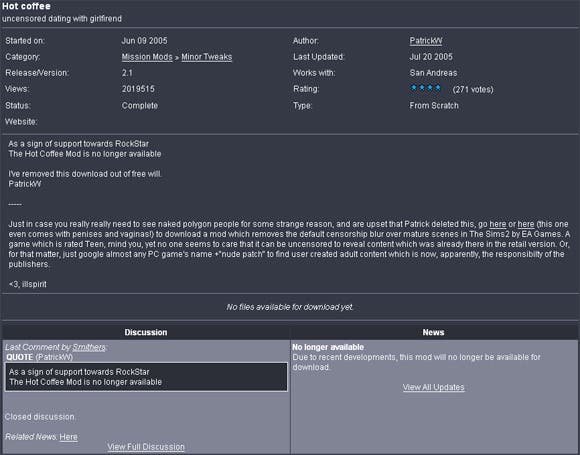
But the full extent of what the modders had discovered was still unclear. “Our assumption at that time was that they were unused animations which were abandoned in the early development of the game,” says Wildenborg.
“There were, however, some references to these animations in the script files. As I was mainly focused on figuring out the scripts I decided to figure out what those references were and if there might be some abandoned code indicating how they might have been used. This particular section of code is complex so it took quite some effort and time to grasp what it did. As I dug deeper it became clear that the code that referenced the animation was not just some abandoned content, but that it was fully working, just configured to be inaccessible.
“Around March 2005 I felt certain this code could be fully functional if we were able to overrule the flag preventing it from executing. But we had no option to try it out on the PS2, so we would never know. That is, unless Rockstar left everything in the PC version due for release in June."
There was nothing to do but wait.
---
The PS2 launch of Grand Theft Auto: San Andreas was a commercial triumph. On 31 October 2004, the end of the fiscal year and just five days after the game's North American release, San Andreas accounted for 20.9 per cent of publisher Take-Two's revenues. Sales of the game topped 5 million in two months.
Despite the runaway success, Sam Houser was haunted by the hidden scenes. On 25 November 2004 he emailed the game's producer, Leslie Benzies, about the PC version, due for release the following summer. “Explore any additional content ideas," he wrote. "[See] how hard we can push the sex stuff… To make it bonkers.”
Benzies replied: “We will get the sex stuff back in the way it was.”
Houser's plan was to release two versions of the PC game, one with a Mature rating and one with an AO rating. “Yes, we will go to places you other f***s wouldn't even consider,” he wrote in another email.
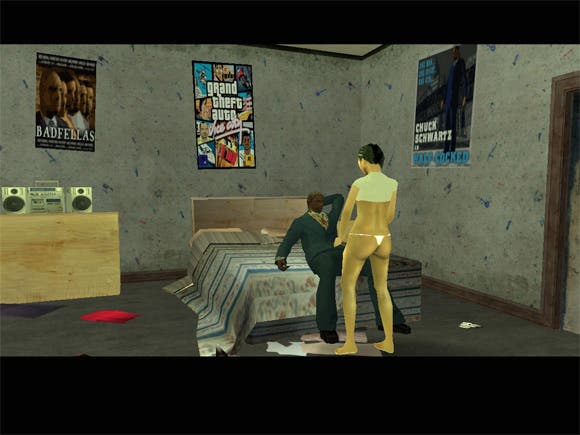
Not everybody at Rockstar was happy with the proposal. In January 2005 Houser sent another email to Benzies, relaying the uncertainties of the sales team over the plan for a dual release of the game: “They are concerned we will get a really intense backlash if we push the PC version too far.”
The team reached a decision. The game would ship in the same state as the PS2 version, with a later, AO-rated patch unlocking the sex scenes in order to, as Sam wrote in another email, “Unlock the darkness.”
---
Wildenborg and his friends made the decision to keep their discovery a secret until the release of the PC version. They feared any media attention ahead of this date might force Rockstar to remove the content before the modders had the chance to discover exactly what the code did.
On 7th June 2005, the PC version of San Andreas was released in the US, three days ahead of its European street date. “I had one of my fellow modders in the USA send me his copy of the script file,” says Wildenborg. “I edited it with a hex editor, to flip the infamous toggle which I believed would unlock the content. I sent it back to him. 15 minutes later he sent me a video.”
"I tossed the name 'Hot Coffee' on the file, based on the fact that the girlfriends would ask CJ in for some 'coffee' as a euphemism for sex. Hot Coffee was the first modification for San Andreas." - Patrick Wildenborg
The video showed that the content wasn't a hidden cut-scene but a pair of playable mini-games. In one, dubbed the “spanking game” by Wildenborg, players were invited to smack CJ's girlfriend on the backside, rhythmically tapping a button to raise an 'EXCITEMENT' bar. In the “shagging game”, players moved the analogue stick in time with the characters' bodies to increase excitement. Both characters remained fully clothed and there were no genital shots. But this was still the most explicit sexual content Wildenborg had seen in a video game.
“It was at this point I decided to release the patch to the public,” he says. “I tossed the name 'Hot Coffee' on the file, based on the fact that the girlfriends would ask CJ in for some 'coffee' as a euphemism for sex. Hot Coffee was the first modification for San Andreas.”
Despite not owning a copy of the game himself, with two days still to go before the game's European release, Wildenborg had spilled Hot Coffee.
---
On the day the PC version of San Andreas launched, Sam Houser was visiting San Diego overseeing the development of Rockstar's next release, Red Dead Redemption. 9th June 2005, two days after Hot Coffee's launch, was a tough day at the office - or, in Sam's case, out of the office. It began with the arrival of news that the studio's parent company, Take-Two Interactive, had been ordered to pay $7.5 million in penalties following a two-year SEC investigation into improper sales reports, allegedly designed to net company execs inflated bonuses. Then, in the afternoon, Houser found a story on the message boards linking to a mod for San Andreas.
“With this mod,” the blurb on the modder's website read, “you will be able to unlock the censored interactive sex games with your girlfriends in San Andreas. Rockstar build [sic] all this stuff in the game, but decided to disable it in their final release for unknown reasons. And now this mod enables these sex games again, so now you can enjoy the full experience.”
Houser called the New York office but nobody answered. According to one anonymous staffer, Rockstar's team of publicists had already been told: “Don't answer the phones. This is going to get ugly.”
Four days later Houser emailed Benzies, the game's producer.
“They found it,” he wrote. “This cause any problems? Hope not as it's pretty cool.”
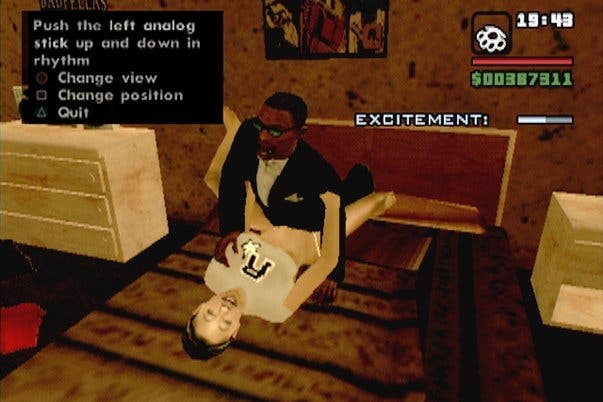
Less than a month later the ESRB announced an official investigation into the Hot Coffee content, pledging to find out whether “a violation of our rules has occurred”.
---
“At no stage did any one of us expect it to blow up to the ridiculous proportions that it did,” says Wildenborg. “The community went wild and the download numbers of the mod broke all records at our site. It was downloaded well over a million times in four weeks. Most people in the community found the mod hilarious. In the first couple of weeks most attention for the mod was rather positive: game sites and game channels wrote and talked about it.”
"I felt like I was in the middle of a warzone, with various media calling and writing for interviews." - Patrick Wildenborg
But when the ESRB announced its investigation, the story caught the attention of the mainstream media. “Over the subsequent days the controversy grew to absurd proportions,” says Wildenborg. “I felt like I was in the middle of a warzone, with various media calling and writing for interviews.” Dutch TV camped outside his family's house while CNN, the New York Times, ABC news and others rang his landline constantly. “The media attention hugely affected our family life, causing a great deal of stress and anxiety. I became concerned about the implications for my family and career and declined to give any interviews.
“But after a while the attention began to die out. Mercifully my employer was very open-minded and supported me. Behind the scenes they formed a team of lawyers, in case the company name became involved. But luckily that never happened. Later on I even did some informal presentations for several departments of our company.” In a bid to deflect some of the media attention, Wildenborg posted a clarification on his website. He made it clear that the mod was only accessible by altering the original code, and that no sex scenes were accessible in a standard retail copy of the game.
“That's when I received a call in the middle of the night from Rockstar headquarters in New York,” says Wildenborg.
“They said they wanted to thank me for the statement I made on my website... At first I thought that someone was pranking me, but they confirmed their identity by email the next day. I guess at that point they assumed it was enough to get the ratings guys off their back.”
---
Over the following weeks the story gathered momentum. On 12th July 2005, the day after Rockstar rang Wildenborg, the company released a statement blaming the Hot Coffee situation on “a determined group of hackers who have gone to significant trouble to alter scenes in the official version of the game.”
The company's US public relations office was determined to push the blame onto the modders, even telling Rolling Stone magazine that the creators of the sexual content were “not within the company.”
The modding community was enraged. “R* are a bunch of f**kign [sic] retards” wrote one incensed forum user. “They're now trying to demonise modding and make us out to be the bad guys.”
Another wrote on the forum: “They are outright lying and trying to discredit Patrick from what I can see. I'm… sure heads will roll at Rockstar for leaving all that unused content in the game.”
Corey Wade, a senior product manager at Rockstar, later admitted the company had picked the wrong strategy. In an interview with the journalist David Kushner, he said: "Blaming it on hackers was a colossal PR screw-up. It was a complete disaster… They lied."
The tactic failed. On 20th July 2005, the ESRB changed the rating of GTA: San Andreas from Mature to Adults Only 18+. Four of America's largest game retailers - Wal-Mart, Target, Best Buy and Circuit City - removed the game from their shelves. Rockstar raced to recall the games while creating a version in which the Hot Coffee content was inaccessible, even with Wildenborg's mod.
As news of the Hot Coffee content spilled into mainstream culture, the issue became politicised. Senator Hillary Clinton called for federal game regulation and the Federal Trade Commission launched its own investigation. A Class Action Complaint For Violations Of Federal Securities Laws was brought against Take-Two, with the plaintiffs alleging: “By merely 'wrapping' rather than removing the Adult Content, Defendants knew that the Adult Content would inevitably be made widely available.”
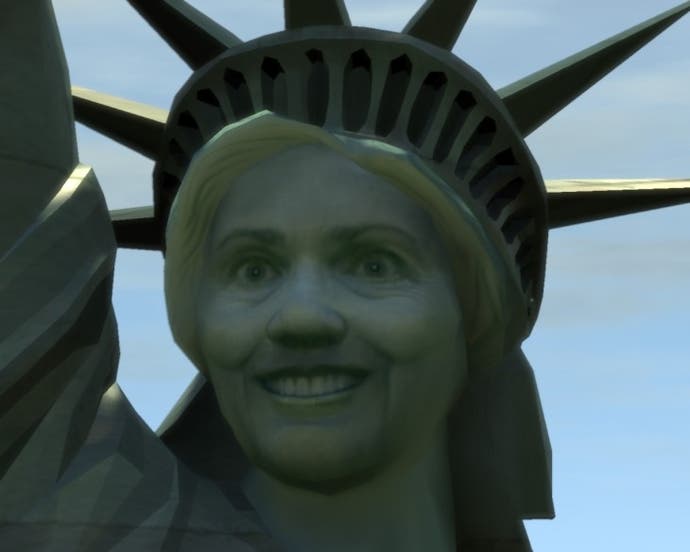
The class action suit concluded: “It is [our] expert opinion that it was 'inevitable' that a modder would locate and unlock such content after the PC version of GTA San Andreas was released.”
In January 2006 Sam Houser entered the FTC building in Washington D.C. He was there voluntarily, and had come to answer questions about whether Rockstar had purposefully deceived the ESRB to avoid an Adults Only rating. The commission had already seized tens of thousands of internal company emails in the process of its investigation and Houser was grilled for nine hours on their details.
“You sat there in a room like this... And there's you and your lawyers and then all these government investigators sitting opposite,” Houser later recalled in an interview with the video game site 1UP. “They've got your emails and they say, 'Why have you put that word in apostrophes? Why have you done this? Why have you done that?' It's a heavy one, right? Not many game designers that have been in that position that I know of… I felt those people were out to crush us, and if they could have crushed us, they absolutely would have.”
In June 2006 the FTC found that Take-Two Interactive was deceptive in the way it marketed GTA: San Andreas but did not fine the company or order that they return any of their profits from the game. Rockstar was not fined but was placed on notice, stating that if they again violate the ratings, they will be subject to a civil fine of up to $11,000 per violation. As part of the deal, Take-Two promised the FTC that it would "clearly and prominently disclose on product packaging and in any promotion or advertisement for electronic games, content relevant to the rating."
But the civil class actions filed against Rockstar trickled on for years to come. Finally, in September 2009, Take-Two settled the securities class action suit for $20,115,000, paid into a fund for the benefit of its members. A little over five years after Houser had first argued that sex should be a natural part of Grand Theft Auto, the financial penalty was paid in full.
But the Rockstar boss couldn't resist one final dig at his critics. San Andreas' follow-up, GTA 4, was based in a fictionalised version of New York. The face on the game's version of the Statue of Liberty bore a striking resemblance to Hillary Clinton. Instead of a flaming torch, she clutched a mug of steaming coffee.
---
Today, Wildenborg has few regrets. “Looking back, I would still have published the mod,” he says. “If I hadn't published it, it was inevitable that someone else would have found it later on and made it public.
“It's a great story to tell at parties and to tell my grandchildren when I'm old and wise,” he laughs.
But nobody on the Rockstar side of the story is willing to tell their tale on the record. One employee explained that Hot Coffee is just too distressing a subject and as such is a taboo in conversation, even among friends at the firm. As Dan Houser, Sam's brother told The Guardian recently, “It was draining and upsetting - a tough time in the company.”
Even those no longer working at the company fear the legal implications of discussing what happened. One ex-staffer I contacted, who another current employee claimed had worked on the sexual content, stated that he had shared our short email exchange with his legal representatives and requested I do not contact him again on the matter. With such vast sums of money involved in the previous Hot Coffee lawsuits, it seems unlikely anyone will risk new controversy and potential legal battles by admitting direct involvement with the content's creation.
"Why would a 17-year-old be allowed to run around the city bearing weapons, a game in which you're free to shoot cops and beat up women but in which you're not allowed to make love to his girlfriend after dating her for a while?" - Patrick Wildenborg
For all the drama, the hand-wringing, the political wrangles and the legal opportunism, there remains a sense of injustice at the heart of the Hot Coffee story. It's best expressed by Wildenborg himself: “From my point of view, I think there is no reason why [this sexual content] shouldn't have been included. After all, the game was already R-rated.
“Why would a 17 year-old be allowed to run around the city bearing weapons, a game in which you're free to shoot cops and beat up women but in which you're not allowed to make love to his girlfriend after dating her for a while? It baffles me how some Americans find two people making love more damaging for a 17 year-old than all the violence in the game.”
This is, perhaps, a cultural war too entrenched for one video game to fight alone. Houser could have taken on the ESRB, arguing that consensual sex acts in video games shouldn't be analogous to Adults Only-rated pornographic content. Perhaps, with so many shareholders to please, the risks were too high. Maybe, with the launch so close, there was not enough time to gather the necessary ammunition to form the arguments. Far easier to comply and simply keep the sex hidden.
But the final costs were nevertheless significant. Beyond the towering financial penalties, the emotional damage to the company appears to have been great. Rockstar has had difficulties when speaking to both the press and its own community (the company declined to comment on this article). In initially blaming hackers for the existence of 'Hot Coffee', the company alienated its most dedicated fans. That decision, made in the heat of a moment, revealed the company as ultimately unprepared to fight this ideological battle on the cultural stage, acting as a multi-million-dollar deterrent for game creators hoping to represent sex in their games.
Rockstar email exchanges taken from the United States District Court Southern District of New York in re Take-Two Interactive Securities Litigation Consolidated Second Amended Class Action Complaint for Violations of Federal Securities Laws.
